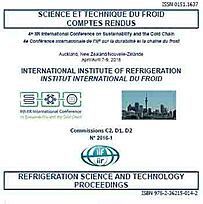
Summary
Research and development of organic phase change materials (PCMs) and inorganic-organic PCMS are reviewed. The advantages and disadvantages of PCMs are analyzed. The phase change cold storage composite material is developed. This composite material is composed of organic and inorganic matter. Its properties include melting point(-4.8?) and phase change fusion latent heat are studied. The Differential Scanning Calorimeter (DSC) is used to determine the properties. The results show that the material is of good thermal performance. It can be used in refrigerated transport for almost fruits and vegetables. The
amount of PCMs B-type needed is calculated for a 20 feet cold hold-over plate refrigerator car. Calculations indicate this kind of refrigerator car is suitable for not more than 36 hours transport for some pre-cooled fruits or vegetables. The paper points out that the performance characteristics, theoretical model of heat transfer, phase transition mechanism and composite technology should be focused on, and organic composite phase change cold storage material is an important developing direction in the future.
Available documents
Format PDF
Pages: 7
Available
Public price
20 €
Member price*
Free
* Best rate depending on membership category (see the detailed benefits of individual and corporate memberships).
Details
- Original title: Development of phase change cold storage materials for refrigerated transportation of fruits and vegetables.
- Record ID : 30017552
- Languages: English
- Source: 4th IIR International Conference on Sustainability and the Cold Chain. Proceedings: Auckland, New Zealand, April 7-9, 2016.
- Publication date: 2016/04/07
- DOI: http://dx.doi.org/10.18462/iir.iccc.2016.0022
Links
See other articles from the proceedings (63)
See the conference proceedings
Indexing
-
Thermal energy storage for sustainable future: ...
- Author(s) : CHIU J. N. W., MARTIN V.
- Date : 2010/06/13
- Languages : English
- Source: IIR/Eurotherm sustainable refrigeration and heat pump technology conference. Proceedings of the Eurotherm Seminar No. 88, Stockholm, Sweden, June 13-16, 2010.
- Formats : PDF
View record
-
Study on thermal properties of a novel PCM and ...
- Author(s) : LI X. Y., QU D., YANG L., et al.
- Date : 2016/04/07
- Languages : English
- Source: 4th IIR International Conference on Sustainability and the Cold Chain. Proceedings: Auckland, New Zealand, April 7-9, 2016.
- Formats : PDF
View record
-
Preparation and properties of lauric acid-decan...
- Author(s) : XU W., ZHANG X., LIU T., et al.
- Date : 2015/08/16
- Languages : English
- Source: Proceedings of the 24th IIR International Congress of Refrigeration: Yokohama, Japan, August 16-22, 2015.
- Formats : PDF
View record
-
Phase-change-material nanoemulsions for energy ...
- Author(s) : KAWAJI M.
- Date : 2018/05/21
- Languages : English
- Source: 12th IIR Conference on Phase-Change Materials and Slurries for Refrigeration and Air Conditioning. Proceedings: Orford, Canada, May 21-23, 2018.
- Formats : PDF
View record
-
Experimental investigation of heat transfer tub...
- Author(s) : TAY N. H. S., BRUNO F., BELUSKO M.
- Date : 2010/04/12
- Languages : English
- Source: 9th IIR-Gustav Lorentzen Conference on Natural Working Fluids (GL2010). Proceedings. Sydney, Australia, April 12-14, 2010.
- Formats : PDF
View record
